#carter G. Woodson
Text
According to historians, this is the true reason Black History Month occurs. The shortest month of the year, February
Frederick Douglass
Many wonder why Black History Month falls in February, which is the shortest month of the year. Historians claim there is an easy solution: Black History Month, which started off as Negro History Week in 1926, is observed in February because it falls on the birthdays of Frederick Douglass and President Abraham Lincoln, two significant abolitionists.
Lincoln was born on…
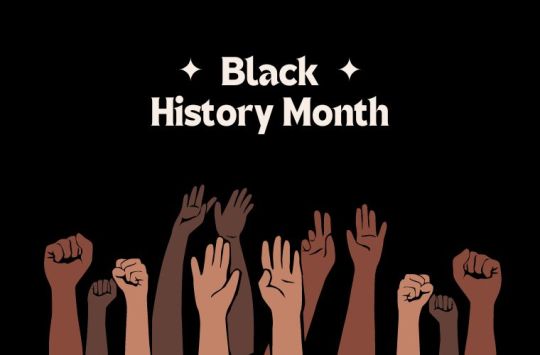
View On WordPress
#Abraham Lincoln#Black History Month#black student strike UW-Madison#carter G. Woodson#Demand Letter#February#Frederick Douglass#Latest#Valentines Day
4 notes
·
View notes
Text
Carter G. Woodson - Quote
We are closing out Black History Month with a quote from the Father of Black History Month, Dr. Carter G. Woodson. Click the link to learn more or listen via podcast.
#BlackMaill4u #BlackHistoryMonth #BlackHistoryQuote #CarterGWoodson #BlackHistoryFact
Welcome To Black Mail!
Where we bring you Black History, Special Delivery.
We close out Black History Month with a quote from the Father of Black History Month, Dr. Carter G. Woodson.
“We have a wonderful history behind us…and it is going to inspire us to greater achievements.”
-Dr. Carter G. Woodson
Dr. Woodson is so right! Our history is rich and wonderful, and it will propel present and…

View On WordPress
#African American History#Black History#Black History Fact#Black History Month#black history quotes#blackmail4u#Carter G. Woodson
14 notes
·
View notes
Text
EDITORIAL: What Black History Month Means to GBN in 2023 and Beyond
by Lori Lakin Hutcherson, GBN founder and Editor-in-Chief
Well, here we are, once again. Forty seven years after February was officially recognized by the U.S. government as Black History Month, and ninety seven years after Negro History Week was founded by Carter G. Woodson, “The Father of Black History.”
We are also, once again, deeply distressed by the murder of a young Black person (Tyre…
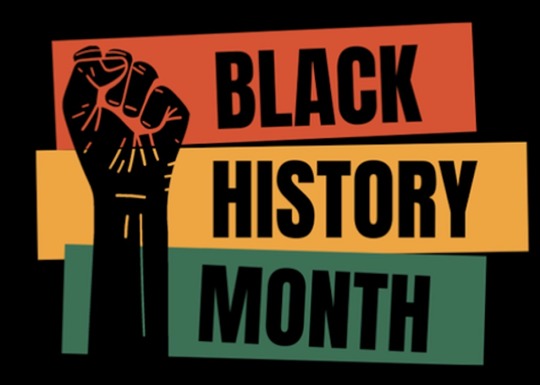
View On WordPress
#Benjamin Crump#Beyoncé#Black History Month#Carter G. Woodson#Dr. Martin Luther King#Frederick Douglass#Good Black News#Harriet Tubman#Jackie Robinson#Jr.#Negro History Week#Nikole Hannah-Jones#Rosa Parks#Sidney Poitier
14 notes
·
View notes
Photo

The Mis-education of the Negro
By Carter G. Woodson.
4 notes
·
View notes
Text
Quote:
How come they gave us the shortest month?
This question often comes from the Black side of the spectrum. Not stupid, just perhaps under-informed. The good news is, a little Black History is all one needs to understand the answer to that question:
National African-American History Month had its origins in 1915 when historian and author Dr. Carter G. Woodson founded the Association for the Study of Negro Life and History. This organization is now known as the Association for the Study of African American Life and History (“ASALH”). Through this organization Dr. Woodson initiated the first Negro History Week in February 1926. Dr. Woodson selected the week in February that included the birthdays of Abraham Lincoln and Frederick Douglass, two key figures in the history of African-Americans.
In 1975, President Ford issued a Message on the Observance of Black History Week urging all Americans to “recognize the important contribution made to our nation’s life and culture by black citizens.” In 1976 this commemoration of Black History in the United States was officially expanded by ASALH to Black History Month, also known as African American History Month, and President Ford issued the first Message on the Observance of Black History Month.- Library of Congress
See? No one “gave us” the shortest month. Black people did it. Black people took agency and created a time to celebrate Black History. Nobody handed it to us. No one made it up for us. Pro-tip: you see something celebrating Blackness, guarantee somebody black was probably behind it. The world ain’t been handing out free “Celebrate Your Blackness” points in a minute.
So to recap: A BLACK PERSON CHOSE FEBRUARY FOR BLACK HISTORY MONTH. And he had serious BLACK REASONS for doing so. If you disagree with Woodson’s reasons, that’s fine. We can certainly discuss. But now you have a Black History answer to your question about Black History Month. Go run tell, tweet and preach that. And read more books. Books are cool.
i highly recommend the entire article and this year's too i'm sure
#i did not know so i am sharing#u.s. history#P. Djèlí Clark#p. djeli clark#black history month#carter g. woodson#2022 edition#but i'm sure he's got one for 2023 now#phenderson djeli clark
2 notes
·
View notes
Text
I am grateful to Dr. Carter G. Woodson for creating Black History Week in 1926, which evolved into a month forty years later in 1976. Happy Black History Month, everybody!
#black america#Happy black history month#February 1st#black history month#Black history#Carter G. Woodson
0 notes
Text
Black August Month Art Sale Event
Black August Month Art Sale Event
Through August 31st, you can purchase Black August – Los Angeles wall art prints for $200. That’s $96% off it’s $5,000 retail value.
In Wikipedia, “Black August is an annual commemoration and prison-based holiday to remember Black freedom fighters and political prisoners and to highlight Black resistance against racial oppression. It takes place during the entire calendar month of August. See…

View On WordPress
#Black Art#Black August#Black August 2022#Carter G. Woodson#contemporary art#Donald "C-Note" Hooker#emerging contemporary art#George Jackson#inspiration#neo Jim Crow art#Online Sales Event#prison art#prisoners#Restorative Justice#Sale Event#Social Justice
0 notes
Text
Black History Month
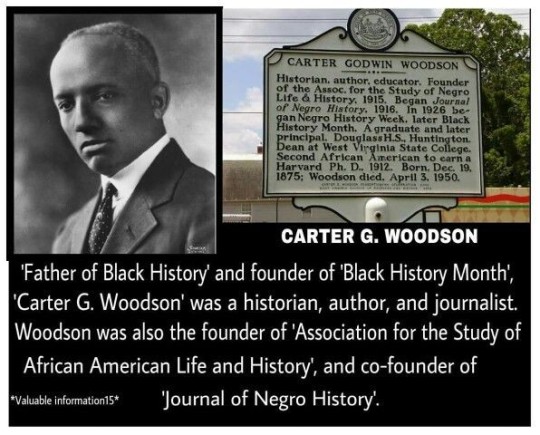
#black tumblr#black history#black literature#black excellence#black community#civil rights#black history is american history#blackexcellence365#carter g woodson#black history month#founder of black history#black archives#black culture
763 notes
·
View notes
Text
Omega Psi Phi Fraternity’s Instrumental In Launching First Negro History Week In 1924
In 1924, the Omega Psi Phi fraternity played a key role in launching the first “Negro History Week” that we now celebrate as Black History Month! Click the link to learn more or listen via podcast.
Welcome To Black Mail!
Where we bring you Black History, Special Delivery.
Passionate about spreading the knowledge of Black History, Carter G. Woodson launched Negro History Week, which we now celebrate as Black History Month. During the national meeting of Omega Psi Phi on December 27, 1920, Woodson gave a powerful speech encouraging his fraternity brothers to promote the study of Black…
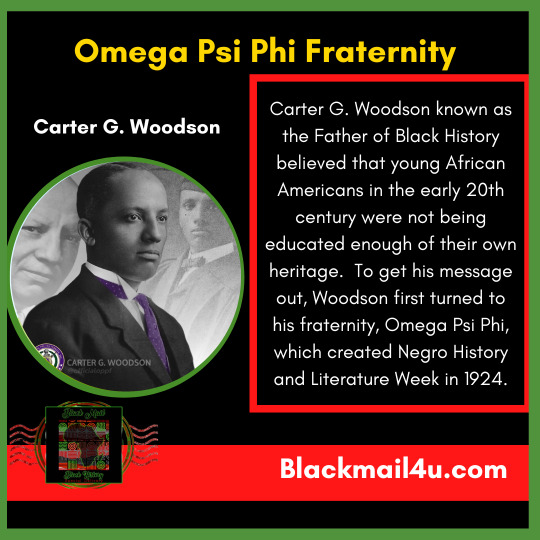
View On WordPress
#ASALH#Black History#Black History Fact#Black History Month#blackmail4u#Carter G. Woodson#Negro History Week#Omega Psi Phi Fraternity
11 notes
·
View notes
Text

Today In History
Dr. Carter Godwin Woodson, was born in New Canton, VA, on this date December 19, 1875. Woodson had worked as a sharecropper, miner and various other jobs during his childhood to help support his large family. Though he entered high school late, he made up for lost time, graduating in less than two years. After attending Berea College in Kentucky, Woodson worked in the Philippines as an education superintendent for the U.S. government. He earned his bachelor’s and master’s degrees at the University of Chicago before entering Harvard. In 1912, three years before founding the ASNLH (Association for the Study of Negro Life and History).
Dr. Carter G. Woodson became the second African American to receive a doctorate from Harvard University after W.E.B. Du Bois.
Woodson believed that young African Americans in the early 20th century were not being taught enough of their own heritage, and the achievements of their ancestors. In 1921 Woodson started his own publication the Associated Publishers Press and housed it at his row house on Ninth Street in Washington D.C. He then turned to his fraternity, Omega Psi Phi, who helped create Negro History and Literature Week in 1924.
In February 1926, Woodson sent out a press release announcing the first Negro History Week. As early as the 1940s, efforts began to expand the week of public celebration of African American heritage and achievements into a longer event. In 1976, on the 50th anniversary of the first Negro History Week, the Association officially made the shift to Black History Month.
Woodson dedicated his career to the field of African American history and lobbied extensively to establish Black History Month as a nationwide institution. He wrote many historical works, including the 1933 book The Mis-Education of the Negro.
We honor Dr. Carter G. Woodson legacy through CARTER™️ Magazine, extending his vision for making African American history available for everyone 365 days a year.
CARTER™️ Magazine
#carter magazine#carter#historyandhiphop365#wherehistoryandhiphopmeet#history#cartermagazine#today in history#staywoke#blackhistory#blackhistorymonth#dr carter g woodson#carter g woodson
90 notes
·
View notes
Text

55 notes
·
View notes
Text

130 notes
·
View notes
Photo


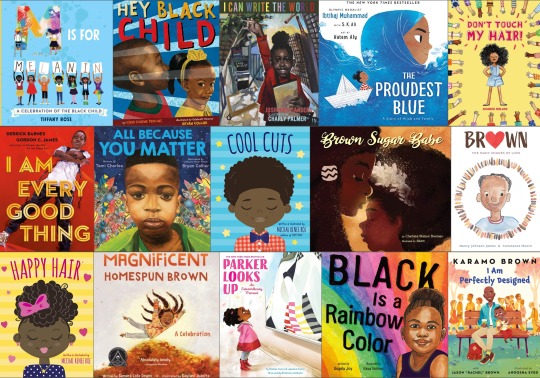
Confident You!: 45 Picture Books for Black History Month and Every Month
106 notes
·
View notes
Text
In 1922, Carter G. Woodson, known as “the father of Black history,” bought the home at 1538 Ninth Street NW for $8,000.Credit...Scurlock Studio Records, Archives Center, National Museum of American History
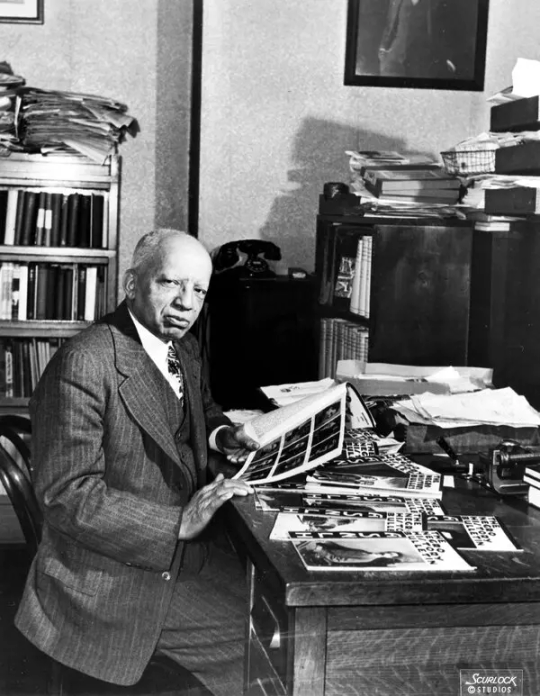
In 1922, Carter G. Woodson, known as “the father of Black history,” bought the home at 1538 Ninth Street NW for $8,000. The home served as the headquarters for the Association for the Study of Negro Life and History (which is now known as the Association for the Study of African American Life and History, or A.S.A.L.H.).
It was where he ran the Associated Publishers, the publishing house focused on African American culture and history at a time when many other publishers wouldn’t accept works on the topic. It’s where The Journal of Negro History and The Negro History Bulletin were based, and it’s where he initiated the first Negro History Week — the precursor to Black History Month — in 1926.
“If a race has no history, if it has no worthwhile tradition, it becomes a negligible factor in the thought of the world, and it stands in danger of being exterminated,” Dr. Woodson famously wrote.
The site, owned by the National Park Service, is being restored and will likely be open to visitors starting this fall, a spokesperson for the Park Service said.
“If a race has no history, if it has no worthwhile tradition, it becomes a negligible factor in the thought of the world, and it stands in danger of being exterminated,” Dr. Woodson famously wrote.Credit...Kenny Holston/The New York Times

Though Dr. Woodson was the kind of neighbor who doted on children playing on the street and his stoop, even as other adults told them to behave, 1538 Ninth Street NW was more about his life’s work than serving as a traditional residence. It became known as Dr. Woodson’s “office home,” as Willie Leanna Miles, who was a managing director of the Associated Publishers, put it in her 1991 article “Dr. Carter Godwin Woodson as I Recall Him, 1943-1950.” The article was published in The Journal of Negro History, which was founded by Dr. Woodson and is still running as The Journal of African American History today.
#The Home of Carter G. Woodson#the Man Behind Black History Month#Dr Carter G Woodson#Black History Month#BHM24#2024#1538 Ninth Street NW DC#The Journal of Negro History#Association for the Study of African American Life and History#A.S.A.L.H#The Negro History Bulletin#Black Historians#Father of Black History Month
11 notes
·
View notes